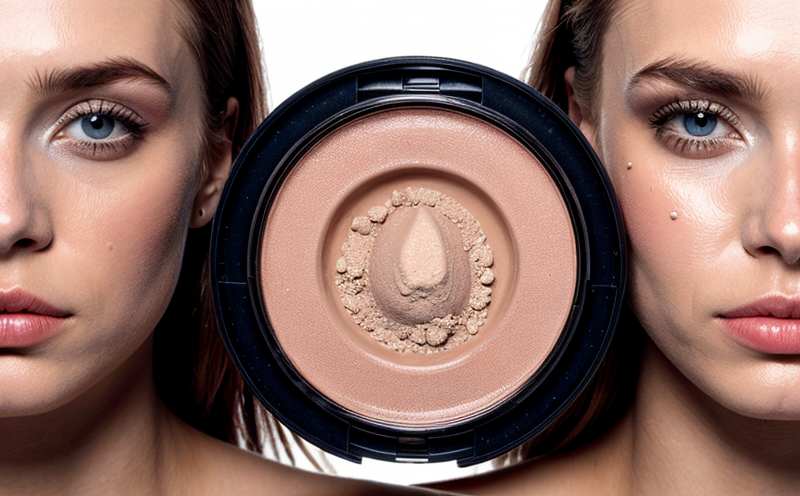Selenium Content Testing in Cosmetics
The testing of selenium content in cosmetics is an essential aspect of ensuring product safety and compliance with regulatory standards. Selenium is a trace element that can be present in various cosmetic products, including hair dyes, shampoos, and skin care items. The presence of selenium may arise from natural sources or as a result of contamination during the manufacturing process.
Testing for selenium content helps manufacturers identify potential risks associated with excessive levels of this element. High concentrations of selenium can lead to adverse health effects such as toxicity, which is particularly concerning given its known carcinogenic properties. By conducting thorough testing at every stage of production, companies can ensure that their final products are safe and meet the stringent requirements set by regulatory bodies.
The process typically involves sampling a representative portion of the cosmetic product, followed by digestion using appropriate chemical methods to release selenium from any bound forms it might be present in. Afterward, instrumental techniques such as atomic absorption spectrometry (AAS) or inductively coupled plasma mass spectrometry (ICP-MS) are employed for accurate quantification.
It is important to note that while some levels of selenium may be beneficial due to its antioxidant properties, excessive amounts can pose risks. Therefore, it becomes crucial to establish a safe limit for selenium content in cosmetics based on scientific evidence and international standards like ISO 13725-1:2019 which provides guidelines for the determination of heavy metals including selenium.
In summary, selenium content testing is vital because it ensures consumer safety by preventing harmful exposures while also supporting product innovation through informed decision-making regarding ingredient selection. This service plays a pivotal role in maintaining high standards within the cosmetics industry and upholding public trust.
Why It Matters
The significance of selenium content testing extends beyond mere compliance; it directly impacts consumer health and well-being. Ensuring that the selenium levels in cosmetic products fall below established safety thresholds not only protects consumers but also enhances brand reputation. For instance, companies that demonstrate a commitment to product safety often enjoy greater customer loyalty and trust.
- Regulatory Compliance: Meeting stringent requirements set by organizations such as the European Union's Cosmetic Regulation ensures compliance with international standards.
- Risk Mitigation: Identifying and managing risks associated with selenium exposure helps prevent potential legal issues and recalls.
- Brand Reputation: Consistent adherence to safety protocols can significantly improve a company’s image in the market.
Avoiding unnecessary scrutiny from regulatory authorities is another key benefit of rigorous testing. Companies that prioritize quality control early on are less likely to face costly interruptions or penalties later down the line. Furthermore, these proactive measures contribute positively towards long-term business sustainability and growth.
Eurolab Advantages
At Eurolab, we pride ourselves on offering comprehensive services tailored specifically to meet the needs of our clients in diverse sectors such as cosmetics testing. Our expertise lies in providing accurate, reliable results using cutting-edge technology and adhering strictly to recognized international standards.
- Innovative Methodologies: Leveraging advanced analytical techniques ensures precise measurement of selenium content even at trace levels.
- Experienced Staff: Our team comprises highly skilled professionals with extensive experience in handling complex samples and interpreting results accurately.
- Comprehensive Reporting: Detailed reports are provided alongside all findings, including recommendations for corrective actions if necessary.
Our commitment to excellence translates into trustworthiness among our clients. By choosing Eurolab, you gain access not just to state-of-the-art facilities but also a partner dedicated to helping you achieve your goals efficiently and effectively.
International Acceptance and Recognition
The importance of international acceptance cannot be overstated when it comes to selenium content testing in cosmetics. Various countries around the world have implemented regulations aimed at protecting consumers from harmful substances like selenium. Here’s a brief overview of some key regions:
- European Union: The Cosmetics Regulation (EC) No 1223/2009 specifies limits for certain heavy metals, including selenium.
- United States: The Food and Drug Administration (FDA) mandates testing for various contaminants in cosmetics under its Good Manufacturing Practice rules.
- China: The People's Republic of China has stringent requirements outlined in its national standards.
Adherence to these guidelines ensures that your products can be sold internationally without facing obstacles due to non-compliance issues. Additionally, obtaining certifications from recognized bodies like NSF International or INCIID adds credibility and enhances marketability for your brand globally.





